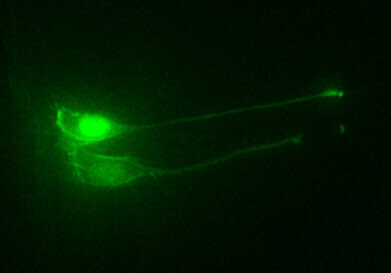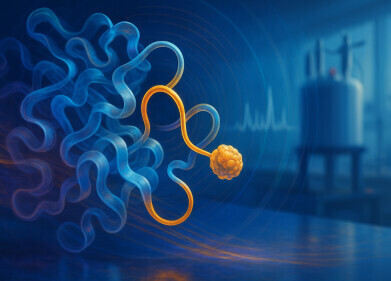-
 Two neurons abscising
Two neurons abscising
Microscopy & microtechniques
Researchers Uncover Secrets of Newborn Neurons
Feb 28 2014
A new form of cell sub-division that is key to the development of the nervous system has been identified by researchers at the University of Dundee.
Neurons are vital to the development of the nervous system and in some regions of our brains they are continually produced throughout our lives. They are `born’ in a particular place in the early nervous system and then have to migrate to the correct place to make functional neural structures.
A team led by Professor Kate Storey and Dr Raman Das in the College of Life Sciences at Dundee have now identified a new process, apical abscission, which mediates the detachment of new-born neurons from the neural tube ventricle – freeing these cells to migrate.
“Neuron production is an important process within our bodies. As an example, our memory centre, the hippocampus, continues to produce neurons throughout our lives,” said Professor Storey.“What we have identified are the molecular events, the `letting-go’ process, which allow newborn neurons to move to their correct place in the nervous system. This is a new form of cell sub-division so it is of significant interest as it tells us about mechanisms that control how we develop that we didn’t know before. We were very surprised when we first saw cells shedding their tip-ends as they began to differentiate into neurons, it is not what we had expected at all.
“Our discovery comes with the development of novel live-tissue imaging approaches in my lab, which allows us to monitor cell behaviour over long periods. We have also been to make use of state of the art super-resolution microscopy in the Light Microscopy Facility based here within the College of Life Sciences.”
The work identifies molecular events that control the shedding of the cell’s tip. It takes place as cells lose a key adhesion molecule and involves increased activity of a cell constriction mechanism.
Surprisingly, this event, also involves dismantling of an important structure in the cell, the primary cilium, known to convey signals that promote cell proliferation. Das and Storey propose that Apical Abscission mediates a pivotal cell state transition in the neuronal differentiation process, rapidly altering the polarity and signalling activity of the new-born neuron.
The researchers plan to extend the work to determine if this new mechanism also operates in other contexts including different regions of the brain, but will also address if this takes place in some cancers, where cells are known to lose polarity, shed primary cilia and detach from their neighbours as a prelude to tissue invasion.
“We need to look more widely now to establish whether this regulated mechanism allows other cells to make rapid cell state transitions and to move in other tissues of the body,” said Professor Storey.
The research was funded by the Wellcome Trust. The results have been published in Science.
Digital Edition
Lab Asia Dec 2025
December 2025
Chromatography Articles- Cutting-edge sample preparation tools help laboratories to stay ahead of the curveMass Spectrometry & Spectroscopy Articles- Unlocking the complexity of metabolomics: Pushi...
View all digital editions
Events
Jan 21 2026 Tokyo, Japan
Jan 28 2026 Tokyo, Japan
Jan 29 2026 New Delhi, India
Feb 07 2026 Boston, MA, USA
Asia Pharma Expo/Asia Lab Expo
Feb 12 2026 Dhaka, Bangladesh
.jpg)
-(2).jpg)
















